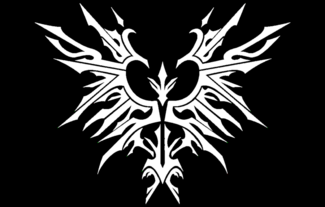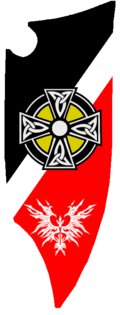Imperial Shaustria
The Holy Empire of Imperial Shaustria | |
|---|---|
| Motto: "The Goddess wills it!" | |
| Capital | Gran Fénix |
| Official languages | Shaustrian |
| Ethnic groups | Shatekens 68.2% Darcoltars 30.1% Other 1.7% |
| Religion | Cult of Rinkara |
| Demonym(s) | Shaustrian |
| Government | Autocratic Theocracy |
• Empress | Vanessa (2011-Present) |
| Legislature | High Court |
| Establishment | |
• Rinkara's Arrival | 2978 B.C. |
• Founding of the Empire | 34 B.C. |
| Area | |
• | 968,001 km2 (373,747 sq mi) |
| Population | |
• Estimate | 150,630,234 |
| Currency | Druchii |
| Time zone | UTC-4 |
| Date format | MM - DD - YYYY |
| Driving side | right |
Shaustria, its official title being Imperial Shaustria, is a Empire located on the continent of Thrismari on Anteria. Shaustria shares a border with Astorii to the south, Caltidev and Prymalia to the east, and Altoset to the north, with the Marigic Gulf to the west. The Empire is 968,001 square kilometers, making it a fairly sizable nation in Anteria. Geographically the nation is dominated by mountains to the north and east, and a freshwater lake, Lake Tenochtitlan, in the center of Shaustria that is a major holy site. The Empire is divided into 18 provinces, with each one holding a number of states. Shaustria is not apart of any major international organizations or groups.
History
Prehistory (Paleolithic - Neolithic)
The earliest records of human life in the lands of Shaustria were found upon cave paintings located near what is now Lake Tenochtitlan. This images depicted early hunting and gathering by the natives of this land. They appeared to settle around the lake, but constantly moved about to track prey and to not diminish natural plant life. There society seemed male dominated, however it did appear that the women did hunt and gather alongside the men, and a cave painting found in one of the eastern provinces appeared to depict a female tribe leader. Eventually by around 10000 B.C. the first permanent settlements were established by various tribes. This was caused by the invention of farming, alongside the first depiction of domesticated wild dogs. Most tribes settled around Lake Tenochtitlan, but these tribes also settled near the coast of the Marigic Gulf and to the north near Lake Sotek. These tribes slowly begin to advance in terms of technology and the formation of cultural heritage. No major religion at this time took a great hold in any settlement, although there is evidence some of the coastal tribes worshipping a type of sea god, though its name is lost to time. Some evidence also points to certain groups heading east towards the mountains, although no proof of residency that early can be found.
Origin of Rinkara
The origin of the Goddess Rinkara is a story that has been recorded since the beginning of the Sha'tek tribe and passed down through generations by the Elders. Although many records contradict each other, the scholar Eektils record has been deemed the most accurate. Her origins begin in the year 2978 B.C., where it is said that the lands surrounding Lake Tenochtitlan where in turmoil. Tribes fought, and as the war dragged on, many starved as crops were destroyed and livestock killed. The Village Elders of the Sha'tek tribe gambled on a final battle with a rival tribe, a battle that would determine the fate of the winner and the loser. So desperate were the people that they prayed to a higher power, something that at the time was not widely done. The only higher powers the tribe believed in were spirits of the dead and of there ancestors. However that day all the people of the village prayed, hoping that there hopes and dreams would be heard and answered. When the moment of the conflict came, and both sides faced each other near the waters edge, it is said that a blinding light came forth from the lake. Both sides blinded, they recovered and then gazed to see what had caused this flash. What they were amazed to see was a tall young woman in a white dress walking across the water towards them. Her hair was described as black long, with dark brown eyes and golden tan skin. Behind her shone a beacon of light that rose from the lake into the sky. No one spoke a word, although a few dropped weapons and others dropped to there knees in both fear and excitement. When she finally reached them, she spoke in a voice that was both gentle and kind, but also resounded for miles for all to hear. She told them that they were here upon this good earth to live and prosper, not to die and suffer. The land around them was rich and fair, and the creatures that habited it were lively and many. She ordered the conflict to end, as war was no way to treat a brother. She then led both the Warbands back to the village of the Sha'tek. There she demonstrated her power, and gave gifts and blessings to the people. She revived the crops, healed the sick, made the blind see and deaf hear. She then made her way to the center of the village, where both tribes gathered. The goddess made her name clear, Rinkara, and that she was the watchful mother of all who followed her. She then chose a young girl from the crowd, and asked her to come forth. She asked her name, and she responded as Maresa. After whispering some words into the young girls ears, she grabbed her shoulders and turned her to face the crowd. There she announced that Maresa was now the leader of both tribes and all who came to join them. She proclaimed that the lands her people inhabited were to be blessed and free of blight, and under the fair rule of the young girl and under the watchful eye of the Goddess, the people would prosper. After this speech, Rinkara proceeded back towards the lake, followed by Maresa and the rest of the newly united inhabitants. Before walking back across the lake, Rinkara turned to the people and spoke for the final time. She told them not to weep her departure. She would watch over the people till the day of reckoning, when the world would plunge into chaos and the kingdoms of man fell. There, she would save all, the good, the bad, and the already gone. Then all would live in bliss in a land of peace and harmony. Following this, no one spoke till the Goddess reentered the brilliant torrent of light, and vanished.

